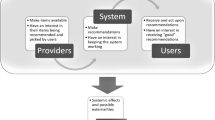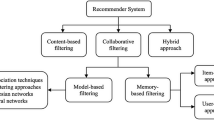Abstract
Previous trust models are mainly focused on reputational mechanism based on explicit trust ratings. However, the large amount of user-generated content and community context published on Web is often ignored. Without enough information, there are several problems with previous trust models: first, they cannot determine in which field one user trusts in another, so many models assume that trust exists in all fields. Second some models are not able to delineate the variation of trust scales, therefore they regard each user trusts all his friends to the same extent. Third, since these models only focus on explicit trust ratings, so the trust matrix is very sparse. To solve these problems, we present RCCtrust – a trust model which combines Reputation-, Content- and Context-based mechanisms to provide more accurate, fine-grained and efficient trust management for the electronic community. We extract trust-related information from user-generated content and community context from Web to extend reputation-based trust models. We introduce role-based and behavior-based reasoning functionalities to infer users' interests and category-specific trust relationships. Following the study in sociology, RCCtrust exploits similarities between pairs of users to depict differentiated trust scales. The experimental results show that RCCtrust outperforms pure user similarity method and linear decay trust-aware technique in both accuracy and coverage for a Recommender System.
Similar content being viewed by others
References
Zhang Y, Chen H, Wu Z, Zheng X. A reputation-chain trust model for the semantic Web. In Proc. the 20th International Conference on Advanced Information Networking and Applications, Vienna, Austria, April 18–20, 2006, pp.719–723.
Golbeck J, Parsia B, Hendler J. Trust networks on the semantic Web. In Proc. Cooperative Intelligent Agents VII, Helsinki, Finland, August 27–29, 2003, pp.238–249.
Hill S, Provost F, Volinsky C. Network-based marketing: Identifying likely adopters via consumer networks. Statistical Science, 2006, 21(2): 256–276.
Epinions. http://www.epinions.com.
Domingos P, Richardson M. Mining the network value of customers. In Proc. the Seventh ACM SIGKDD International Conference on Knowledge Discovery and Data Mining, California, USA, August 26–29, 2001, pp.57–66.
Richardson M, Domingos P. Mining knowledge-sharing sites for viral marketing. In Proc. the Eighth ACM SIGKDD International Conference on Knowledge Discovery and Data Mining, Alberta, Canada, July 23–26, 2002, pp.61–70.
Massa P, Avesani P. Trust-aware collaborative filtering for recommender systems. In Proc. Federated International Conference On The Move to Meaningful Internet: CoopIS, DOA, ODBASE, Larnaca, Cyprus, October 25–29, 2004, pp.492–508.
Victor P, Cornelis C, Teredesai A M, De Cock M. Whom should I trust? The impact of key figures on cold start recommendations. In Proc. the 23rd Annual ACM Symposium on Applied Computing, Ceará, Brazil, March 16–20, 2008, pp.2014–2018.
Kamvar S D, Schlosser M T, Garcia-Molina H. The Eigen-trust algorithm for reputation management in P2P networks. In Proc. the Twelfth International World Wide Web Conference, Budapest, Hungary, May 20–24, 2003, pp.640–651.
Wang Y, Vassileva J. Bayesian network-based trust model. In Proc. the 2003 IEEE/WIC International Conference on Web Intelligence, Halifax, Canada, October 13–16, 2003, pp.372–378.
Yu B, Singh M P. A social mechanism of reputation management in electronic communities. In Proc. the Fourth International Workshop on Cooperative Information Agents, Boston, USA, July 4–7, 2000, pp.154–165.
Liang Z, Shi W. Pet: A personalized trust model with reputation and risk evaluation for P2P resource sharing. In Proc. the 38th Annual Hawaii International Conference of System Sciences, Big Island, USA, January 3–6, 2005, p.201b.
Liang Z, Shi W. Enforcing cooperative resource sharing in untrusted P2P computing environments. Mobile Networks and Applications, 2005, 10(6): 971–983.
Liang Z, Shi W. Analysis of ratings on trust inference in open environments. Performance Evaluation, 2008, 65(2): 99–128.
Xiong L, Liu L. Peertrust: Supporting reputation-based trust for peer-to-peer electronic communities. IEEE Transactions on Knowledge and Data Engineering, 2004, 16(7): 843–857.
Xiong L, Liu L. A reputation-based trust model for peer-to-peer ecommerce communities. In Proc. IEEE International Conference on E-Commerce, Newport Beach, USA, June 24–27, 2003, pp.275–284.
Bizer C, Oldakowski R. Using context- and content-based trust policies on the semantic Web. In Proc. the 13th International Conference on World Wide Web, New York, USA, May 17–20, 2004, pp.228–229.
Hu M, Liu B. Mining opinion features in customer reviews. In Proc. the Nineteenth National Conference on Artificial Intelligence, San Jose, USA, July 25–29, 2004, pp.755–760.
Edelman trust barometer. November 2007. http://www.ede-lman.co.uk/trustbarometer/.
Bellman R, Giertz M. On the analytic formalism of the theory of fuzzy sets. Information Sciences, 1973, 5: 149–156.
Jean-Sébastien Brunner, Li Ma, Chen Wang et al. Explorations in the use of Semantic Web technologies for product information management. In Proc. the 16th International World Wide Web Conference, Banff, Canada, May 8–12, 2007, pp.747–756.
Rdf primer. February 2004, http://www.w3.org/TR/rdf-primer/.
Chun Zeng, Chun-Xiao Xing, Li-Zhu Zhou, Xiao-Hui Zheng. Similarity measure and instance selection for collaborative filtering. International Journal of Electronic Commerce, 2003, 8(4): 115–129.
Author information
Authors and Affiliations
Corresponding author
Additional information
This work is supported by the National High-Technology Research and Development 863 Program of China under Grant No. 2006AA01A123, National Science Fund for Distinguished Young Scholars under Grant No. 60525202, Program for Changjiang Scholars and Innovative Research Team in University under Grant No. IRT0652, Defense Advanced Research Foundation of the General Armaments Department of the PLA under Grant Nos. 9140A06060307JW0403 and 9140A06050208JW0414.
Rights and permissions
About this article
Cite this article
Zhang, Y., Chen, HJ., Jiang, XH. et al. RCCtrust: A Combined Trust Model for Electronic Community. J. Comput. Sci. Technol. 24, 883–892 (2009). https://doi.org/10.1007/s11390-009-9279-3
Revised:
Published:
Issue Date:
DOI: https://doi.org/10.1007/s11390-009-9279-3




